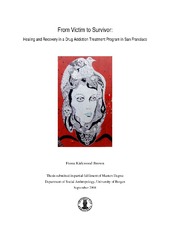| dc.description.abstract | In this thesis I explore clients’ participation in therapy groups at a drug treatment program in San Francisco. Based on six months of ethnographic fieldwork, following women in their daily attempts at “working the program”, I attempt to make sense of the collective recovery process clients engaged in through participation in daily group sessions. I investigate how the particular language used in group sessions served as potential resources for the women, enabling them to approach drug use, engagement in sex trade practices, and recovery from new perspectives. The use of dichotomies, such as the distinction between the “active addict” and the “recovering addict”, was a central part of this sense making project, helping clients navigate in recovery. The women’s personal experiences served as material for collective reflections on “healthy” and “unhealthy” practices and mentalities.The women were struggling not only with drug addiction, but also with other concerns such as untreated trauma, abuse, engagement in sex trade practices, and unstable living conditions. Treatment therefore addressed not only drug addiction, but a wide range of issues. A central aspect of the treatment language was the inherent polysemy. While this could potentially lead to miscommunications, the vagueness of the language also made communication possible by enabling clients to speak of “trauma” or “healing” as if they had one meaning. With prolonged participation in groups, clients’ “sharings” and interpretations would increasingly resemble those promoted in groups. Competent participation in group sessions required a degree of familiarity with the expectations and specific ways of talking at the Healing Center. I approach this in terms of the negotiation of different forms of capital. However, while clients could be successful in displaying their knowledge about the correct ways of speaking and acting in group sessions, “working the program” required that they also applied the material on their everyday lives outside the center. Keywords: capital, communication, discourse, drug addiction, drug treatment, frame analysis, identity work, narrative, prostitution, United States. | en_US |
